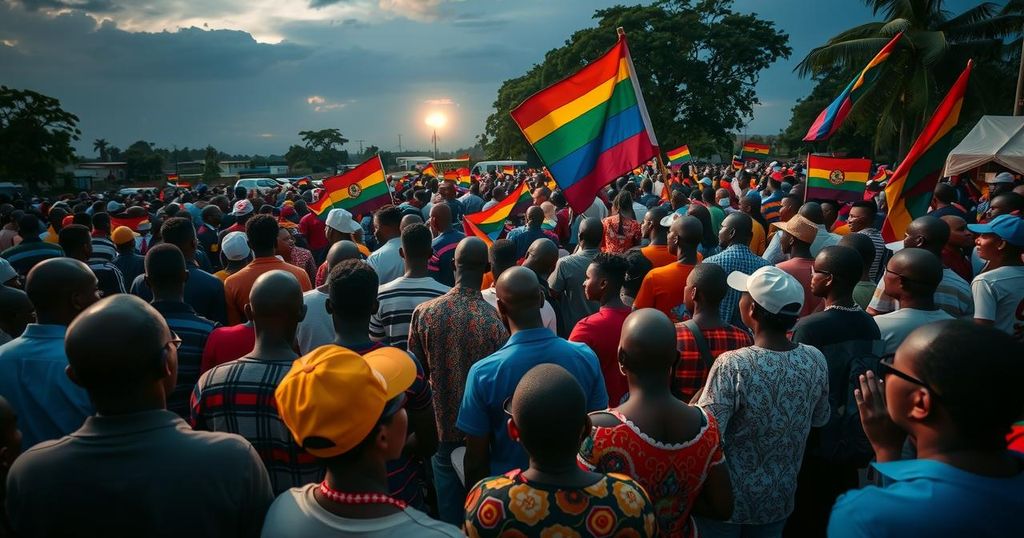Tensions Rise in Mozambique as Protests Erupt Over Murder of Opposition Lawyer

Thousands gathered in Mozambique to mourn the murdered attorney of opposition leader Venancio Mondlane, calling for protests as election results loom, amid accusations of electoral fraud and violence by security forces. Mondlane has pledged a 25-day series of protests against the ruling Frelimo party, which is expected to win the elections, according to initial reports. EU observers have raised concerns about the integrity and legitimacy of the election process, reflecting a growing tension in the nation.
In Maputo, Mozambique, thousands congregated to commemorate the life of Elvino Dias, the slain lawyer for opposition candidate Venancio Mondlane, amidst rising tensions ahead of the anticipated release of election results. Mondlane has initiated a call for 25 days of protests in response to Dias’s murder, which he asserts was orchestrated by security forces in an attempt to thwart democratic processes as results from the October 9 elections suggest a probable victory for the ruling Frelimo party. Mondlane vehemently denounced the forthcoming election results, claiming they would be “false” and asserting that his attorney was killed while preparing to challenge the integrity of the elections. Large crowds gathered for Dias’s burial, demonstrating public discontent and a demand for justice. In a social media message, Mondlane stated he would inflict “25 days of terror” in retaliation for the killings, underlining the escalating hostility surrounding the electoral proceedings. Authorities have commenced an investigation into the described killings, while the long-dominant Frelimo party condemned the incident as a “macabre act.” The government has urged citizens to maintain peace as they await the official electoral results. Recent events have seen Mondlane facing police violence during protests, where he advocated for a general strike against both the murder of his lawyer and alleged electoral fraud. European Union observers have voiced skepticism regarding the election’s authenticity, citing instances of irregularities in ballot counting and unauthorized modifications to results at various polling places. Preliminary reports indicate a low voter turnout, which could further compromise the election’s legitimacy. President Filipe Nyusi will not seek re-election after completing two terms in office, with Frelimo’s candidate, Daniel Chapo, presumed favored to win. Additional candidates include Ossufo Momade of the Renamo party and Lutero Simango of the Mozambique Democratic Movement, although Mondlane’s rise with the Podemos party has introduced a new dynamic to the electoral landscape, particularly among the country’s youth seeking transformative change.
The political climate in Mozambique has recently become increasingly volatile, especially in light of the murder of a prominent attorney associated with opposition figures. Opposition leader Venancio Mondlane’s accusations against the ruling Frelimo party fetch serious allegations of violence and electoral misconduct just ahead of announcing election results. The calls for mass protests highlight deep-rooted frustrations concerning governance, rule of law, and electoral integrity in a country where the Frelimo party has maintained power for decades. This situation has also attracted international scrutiny, particularly from observer missions that have reported discrepancies in the election process. As tensions escalate, the ability of authorities to maintain public order and address concerns will be critical in shaping the future political landscape of Mozambique.
The rallying of thousands in Maputo underscores rising discontent in Mozambique regarding governmental practices and electoral transparency. The opposition’s immediate calls for protests following the murder of their attorney demonstrate not only a quest for justice but also a broader challenge to the ruling party’s long-standing authority. As the nation awaits official electoral results, the legitimacy of the electoral process remains in doubt, prompting reflections on the role of civil society and the potential for significant political change moving forward.
Original Source: www.arabnews.com







